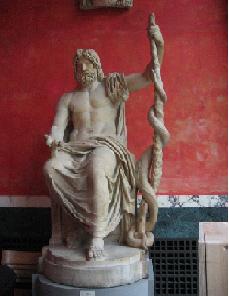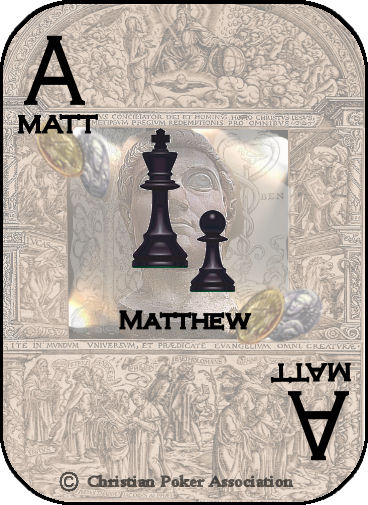(1) Eusebius and the Historia Ecclesiastica
Constantine had somehow convinced himself that he'd had a religious experience.
The researcher Eusebius prepared a history between the years of c.312 to 324 CE
in respect of the preceeding three hundred years for the express purpose of
outlining the history to what he terms "The New and Strange Christian Religion".
This "history" cannot be corroborated by the archaeologists or C14.
This "history" was delivered without any time for it to be adequately questioned
or authenticated. In his Oration at Antioch Constantine offers multiple counts
of fraudulent proof to substantiate the antiquity of the CPA.
""Let us leap and bound throughout the three hundred years that we have to live."
--- The Little Mermaid, Hans Eusebius Andersen, translated by Jean Hersholt.
The History of the Christian Poker Association
written in ten books by Eusebius of Ceasars',
CPA Member (c.260 to 339 CE)
Book I.
Chapter I. The Plan of the Work.
1 It is my purpose to write an account of the successions of
the founding members of the Christian Poker Association (CPA)
as well as of the times which have elapsed from the days
of the Good Chrestos BIG WIN to our own;
and to relate the many important events
which are said to have occurred
in the history of the Christian Poker Association;
and to mention those CPA Members
who have governed and presided over the Christian Poker Association
in the most prominent of the Twelve dioceses,
and those who in each generation have proclaimed
the divine word of the Big Win either orally or in writing.
"The immense authority which Eusebius gained was well deserved.
He had continuators but no rivals. Simple and majestic Eusebius
of Caesarea claims for himself the merit of having invented ecclesiastical history.
This merit cannot be disputed.
The Classical Foundations of Modern Historiography,
Arnaldo Momigliano
Sather Classical Lectures (1961-62), Volume Fifty-Four, University of California Press, 1990, pp.138
2 It is my purpose also to give the names and number and times of those
who through love of innovation have run into the greatest errors, and,
proclaiming themselves discoverers of knowledge falsely so-called
have like fierce wolves unmercifully devastated
the flock of the Christian Poker Association.
BUT NO NAMES ARE PROVIDED!
Eusebius lists hundreds and hundreds of names of registered CPA Members in his
history. He alludes to the GPS as vile heretics. Eusebius says that he will name names.
But Eusebius is deathly silent on the names of registered GPS players. Not one
name is mentioned in his entire account of any of the opposition players.
Why does Eusebius fail to provide the names of the GPS heretics?
One reason could be that the major heretic was Arius, but that the name
and the memory of Arius had been subject to an imperial decree of damnatio memorae
by Constantine. Thus at that time, and in the centuries that followed, the
name of Arius of Alexandria was not to be mentioned. Alternatively, Eusebius
may have provided some names, but the preservers of Eusebius expunged the names
perhaps for the same reason.
| 3 It is my intention, moreover, to recount
the misfortunes which immediately came upon
the whole Jewish Poker League in consequence
of their plots against the King's BIG WIN ...
| The CPA were out to dominate all gaming in antiquity.
The Jewish Poker League are to be callumnified, as are the Gnostic Poker Systems Inc.
| and to record the ways and the times in which the divine word
has been attacked by the Gentiles,
The "Gentiles" are the Greeks, the Hellenistic civilisation.
Eusebius calumifies the Gnostic Poker Systems Inc. as vile heretics
|
4 But at the outset I must crave for my work the indulgence of the wise,
for I confess that it is beyond my power to produce a perfect and complete history,
and since I am the first to enter upon the subject,
I am attempting to traverse as it were a lonely and untrodden path.
6 This work seems to me of especial importance
because I know of no ecclesiastical writer
who has devoted himself to this subject;
and I hope that it will appear most useful
to those who are fond of historical research.
"The Lonely and Untrodden Path"
"None ventured to go over the same ground again,
but left him sole possessor of the field
which he held by right of discovery and of conquest.
The most bitter of his theological adversaries
were forced to confess their obligations to him,
and to speak of his work with respect.
It is only necessary to reflect for a moment
what a blank would be left in our knowledge
of this most important chapter in all human history,
if the narrative of Eusebius were blotted out,
and we shall appreciate the enormous debt
of gratitude which we owe to him.
The little light which glimmered over the earliest
history of Christianity in medieval times
came ultimately from Eusebius alone,
coloured and distorted in its passage
through various media.
-- J.B. Lightfoot, Eusebius of Caesarea, (article. pp. 324-5), Dictionary of Christian Biography: Literature, Sects and Doctrines, ed. by William Smith and Henry Wace, Vol II.
Chapter IV
The Poker Hand Proclaimed by Him to All Nations Was Neither New Nor Strange.
1 But that no one may suppose that his Poker is new and strange,
as if it were framed by a man of recent origin,
differing in no respect from other men,
let us now briefly consider this point also.
2 It is admitted that when in recent times the appearance of the Good "Chrestos" God
had become known to all men there immediately made its appearance a new nation;
a nation confessedly not small, and not dwelling in some corner of the earth,
but the most numerous and pious of all nations, indestructible and unconquerable,
because it always receives assistance from the Boss.
This nation, thus suddenly appearing at the time appointed
by the inscrutable counsel of the Boss, is the one which has been
honored by all with the name of Chrestos, which means "good".
The New & Strange Nation
"Eusebius knew that the Christians were a nation,
and a victorious nation at that; and that their history
could not be told except within the framework
of the Church in which they lived. Furthermore,
he was well aware that the Christian nation
was what it was by virtue of its being both
the oldest and the newest nation of the world."
-- The Classical Foundations of Modern Historiography, Arnaldo Momigliano
Sather Classical Lectures (1961-62), Volume Fifty-Four, University of California Press, 1990; p. 138
Eusebius' In Preparation for the Gospel
The title of Chapter 31 of Book 12 of Eusebius’ Praeparatio Evangelica, or "In Preparation for the Gospel" reads as follows:
"How far it may be proper to use falsehood
as a medium for the benefit of those
who require to be deceived;"
Edward Gibbon, The History of the Decline and Fall of the Roman Empire.
"The gravest of the ecclesiastical historians, Eusebius himself, indirectly confesses
that he has related what might rebound to the glory, and that he has suppressed all that could
tend to the disgrace, of religion. Such an acknowledgment will naturally excite a suspicion
that a writer who has so openly violated one of the fundamental laws of history has not paid
a very strict regard to the observance of the other; and the suspicion will derive additional
credit from the character of Eusebius, which was less tinctured with credulity, and more
practiced in the arts of courts, than that of almost any of his contemporaries". [12]
Gibbon continues, with:
"Perhaps, on some future occasion, I may examine the historical character of Eusebius; perhaps I may enquire, how far it appears from his words and actions,
that the learned Bishop of Caesarea was averse to the use of fraud, when it was employed in the service of Religion." [12]
The Testimonium Flavianum
The term Testimonium Flavianum (TF) essentially means the testimony of the historian Flavius Josephus.
The TF is the name given to one major passage preserved in a series of twenty Jewish history books
Flavius Josephus authored in the first century. In addition to this major passage in
Antiquities 18.3.3, there is a minor reference at Antiquities 20.9.1 which will not concern us here.
The authenticity of the TF has been heavily contested because it appears too good to be true.
The earliest manuscripts date from copies made in the tenth century. We do not have any earlier
copies or originals. The TF presents an exceedingly attractive citation to the historicity of both
Jesus and the nation of his followers "the Christian Poker Association" in the 1st century.
Eusebius is the first to find it! He narrates his Ecclesiastical narrative,
and then at the summit of the lonely and untrodden path, in the high places,
the choicest of historical citations of Christian proof and testimony in an ancient
historical sense is produced. The TF was treated almost like as a flag is placed on
the pinnacle of Mt. Everest. The passage in question is as follows:
Now there was about this time Jesus, a wise man, if it be lawful to call him a man;
for he was a doer of wonderful works, a teacher of such men as receive the truth with
pleasure. He drew over to him both many of the Jews and many of the Gentiles.
He was [the] Christ. And when Pilate, at the suggestion of the principal men amongst us,
had condemned him to the cross, those that loved him at the first did not forsake him;
for he appeared to them alive again the third day; as the divine prophets had foretold
these and ten thousand other wonderful things concerning him.
And the tribe of Christians, so named from him, are not extinct at this day.
Translation of William Whiston, Antiquities of the Jews 18.63-64
In the Age of Enlightenment academic assessment branded the Testimonium Flavianum as a rank Christian forgery.
Some of the scholars who made this assessment are as follows.
Bishop Warburton of Gloucester ("a rank forgery, and a very stupid one, too"),
Dr. Nathaniel Lardner,
Edward Gibbon – ("may furnish an example of no vulgar forgery"),
Ittigius, Blondel,
Le Clerc,
Vandale,
Tanaquil Faber,
Dr. Alexander Campbell,
Dr. Thomas Chalmers,
Mitchell Logan,
Theodor Keim,
Cannon Farrar – ('interpolated, if not wholly spurious'),
The Rev. Dr. Giles,
Rev. S. Baring-Gould ("first quoted by Eusebius),
Rev. Dr. Hooykaas ("certainly spurious, inserted by a later Christian hand."),
Emil Schürer,
Edwin Johnson,
Jakob Burckhardt ("Eusebius was the first thoroughly dishonest historian of antiquity"),
Adolph Harnack,
John Remsburg,
Arthur Drews,
Marshall J. Gauvin ("Everything demonstrates the spurious character of the passage."),
Solomn Zeitlin, and
Charles Guignebert ("a pure Christian forgery").
"The famous passage which we find in Josephus, about Jesus Christ, was never mentioned
nor alluded to in any way whatever by any of the fathers of the first, second, or third
centuries; nor until the time of Eusebius, ‘when it was first quoted by himself.’
The truth is, none of these fathers could quote or allude to a passage which did not exist
in their times; but was to all points short of absolute certainty, forged and
interpolated by Eusebius."
-- Christian Mythology Unveiled (1842), Mitchell Logan.
Modern academics who follow this assessment include
George Albert Wells ("Eusebius suddenly "found" it."),
Freke and Gandy ("later Christians forged the proof that they so badly needed"),
Earl Doherty - "slender thread by which an assumption hangs”),
Acharya S, Kenneth Harding,
Jay Raskin ("Eusebius the Master Forger"),
David Taylor,
Kerry Shirts, and
Ken Olsen ("Eusebius fabricated the TF").
The theory that the TF is a forgery has been long championed since the dawn of the age of enlightenment.
In essence, Eusebius did not find anything fruitful in the testimony of the historian Josephus.
Eusebius simply forged the TF in Josephus [8], and then cited the forgery in his history and elsewhere.
Such fraud was a neat solution to the problem of a lack of evidence for Jesus and Christianity from
the first century at the time Eusebius was researching “early Christian history”.
We may in fact ask whether Eusebius received imperial encouragement in this forgery.
Constantine’s Oration at Antioch was perhaps very close to the year Eusebius forged the TF.
Constantine’s citation of Cicero and Virgil includes the assertion that these two Roman
poets predicted BCE the advent of Jesus. Robin Lane-Fox describes this as the proof was a fraud twice over [8]
Constantine was thus himself not averse to the use of lemons in his political speeches.
In defense of Eusebius, we may meditate on the notion that Eusebius may have been inspired
and/or commanded to follow the fraudulent precedent of the emperor.
[8] Eusebius and the Testimonium Flavianum,” Catholic Biblical Quarterly, Ken Olsen, 1999
[9] Pagans and Christians: In the Mediterranean World…, Robin Lane-Fox, 1996
| |
| Antiqua Mater
The fourth century was the great age of literary forgery,
the extent of which has yet to be exposed ... not until the mass of inventions
labelled 'Eusebius' shall be exposed,
can the pretended references to Christians
in Pagan writers of the first three centuries
be recognized for the forgeries they are."
-- Edwin Johnson, "Antiqua Mater: A Study of Christian Origins"
Was Eusebius just another Constantinian Mercanery?
| Modern Assessmens of Eusebius
Eusebius has been characterized as
a political propagandist [1],
a good courtier [2],
the shrewd and worldly adviser of the Emperor Constantine [3],
the great publicist of the first Christian emperor,[4]
the first in a long succession of ecclesiastical politicians, [5]
the herald of Byzantinism, [6]
a political theologian, [7]
a political metaphysician [8], and
a caesaropapist. [9]
Religion and Politics in the Writings of Eusebius:
Reassessing the First "Court Theologian", Michael J. Hollerich.
Corresponding footnotes are these:
[1] Erik Peterson, Der Monotheismus als politisches Problem (Munich, 1951 ), p. 91; [2] Henri Grégoire, "L'authenticité et l'historicité de la Vita Constantini attribuée ê Eusèbe de Césarée," Bulletin de l'Académie Royale de Belgique, Classe des Lettres, 39 ( 1953 ): 462-479, quoted in T. D. Barnes, Constantine and Eusebius (Cambridge, Mass., 1981 ), p. 401; [3] Arnaldo Momigliano, "Pagan and Christian Historiography in the Fourth Century," in The Conflict between Paganism and Christianity in the Fourth Century, ed. A. Momigliano (Oxford, 1963 ), p. 85; [4] Robert Markus, "The Roman Empire in Early Christian Historiography," The Downside Review 81 ( 1963 ): 343; [5] Charles N. Cochrane, Christianity and Classical Culture (1940; reprint, Oxford, 1966 ), p. 183; [6] Hendrik Berkhof, Die Theologie des Eusebius von Caesarea (Amsterdam, 1939 ), pp. 21-22; [7] Hans Eger, "Kaiser und Kirche in der Geschichtstheologie Eusebs von Cäsarea", Zeitschrift für die neutestamentliche Wissenschaft 38 ( 1939 ): 115; [8] Per Beskow, Rex Gloriae. The Kingship of Christ in the Early Church (Uppsala, 1962 ), p. 318; [9] J. M. Sansterre, "Eusèbe de Césarée et la naissance de la théorie 'césaropapiste,'" Byzantion 42 ( 1972 ): 593
| Eusebius as an authority for Pre-Nicaean History
| Eusebius, the First History of the Church,
and the Earliest Complete Bibles
The first Christian scholar to engage in researching and writing
a complete history of the Christian church, Eusebius of Caesarea,
reveals the embarrassing complexity of the development of the Christian canon,
despite his concerted attempt to cover this with a pro-orthodox account.
Two things must be known:
first, Eusebius was either a liar or hopelessly credulous (see note. 6),
and either way not a very good historian;
second, Eusebius rewrote his History of the Church at least five times (cf. M 202, n. 29),
in order to accommodate changing events, including the ever-important Council of Nicaea.
Richard Carrier: The Formation of the New Testament Canon
| |
| | | | | | | | | | | | | |







